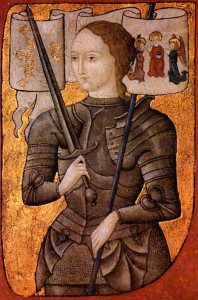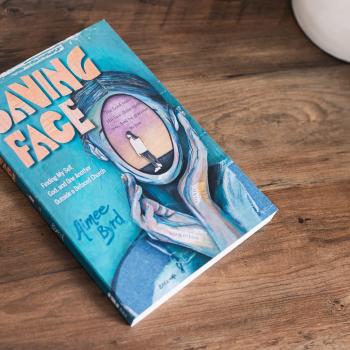Imagine a world rife with misogyny and governed by patriarchy. A world where women are identified primarily by their sexual status (virgins, wives, widows, prostitutes)….where rapists mostly go free….where women go to church more frequently than men, yet are mostly banned from leadership roles….where women earn less pay than men for the same work in the same occupations……
No, I actually am not talking about our modern world (despite the parallels). I am talking about the world of fifteenth-century Europe.
So let me tell you why.
In the year 1429 a miracle occurred (at least if you were French…the English thought rather differently about it). A really crazy miracle. The French heir to the throne gave his army to a sixteen-year old peasant girl who
heard voices and had no military training. Instead of leading to disaster, however, this act of desperation actually worked. The French army defeated the besieging English forces. In fact, this untrained teenage girl helped turn the tide of the entire war (the Hundred Years War, for those curious). She even presided over the coronation of Charles VII of France, thus guaranteeing that the English king would never get the French throne.
Of course she was Joan of Arc.
Shortly after the crowning of Charles VII, a French court historian published a poem about Joan’s success. Here is part of it:
“I begin now for the first time to laugh.
I begin to laugh frankly with joy because winter is departing…the good weather is back…
I will change my language from weeping into singing.
In 1429 the sun began to shine again. Charles, French king, seventh of that noble name..see how your renown is exalted by the Maid, who has subjugated your enemies under your flag—and this is something new—
You, Joan, were born at a propitious hour, blessed be He who created you! Maid, ordained by God… She was sent by divine command.
Oh, what an honor to the female sex!
That God loves the female sex is clear…the realm [is] elevated and restored by a woman—something a hundred thousand men could not have done.”
I promise I will talk more about Joan of Arc in a later post. The person I want to focus on is actually the professional court historian who commemorated Joan and celebrated her for accomplishing “something a hundred thousand men could not have done:” Christine de Pizan.
Maybe you have heard of her?
After all, she was a woman who became a professional writer in medieval Europe. She was a young widow who never remarried. She was a working singlemom who supported her family during an age when most women needed the connections and wealth of their husbands and fathers to survive. And she was an activist against misogyny.
Her extraordinary story had an ordinary beginning. Born in Venice in 1364, Christine grew up in France when her father (a famous physician and astrologer) was hired at the court of the French king Charles V. At the age of 15 she married a member of the French court, a notary and secretary, and had three children.
Then her story changed. Charles the V died and her family lost its status at court. Her father died almost penniless a few years later, followed by the death of her husband.
Christine de Pizan was a widow in her twenties with 2 small children (one died in infancy), a mother, and a niece to support.
So what did she do? She turned to what she knew to support her family. She was a well-educated woman, thanks to her father (as women were barred from university education at this time). And she had always been a good writer.
She began to write professionally, first as a manuscript copyist and later as an author. She began with poetry (love ballads) and devotional religious texts. Then she got her big break in 1404. Philip of Burgundy commissioned her to write a biography of his brother, Charles V. The rest, as they say, is history.
Out of all of her writings however, perhaps she is most famous for her attack on misogyny and defense of women.
One o f the “bestsellers” in Christine’s world was a thirteenth-century text called The Romance of the Rose (yes—medieval people bought romance novels too….). C. S. Lewis called it “the most important literary phenomenon of the later Middle Ages.” It was an allegory of love about a young man questing after a rose bud (just think about it…). Although the first author of the text, Guillaume de Lorris, was less hostile towards women, the second author—Jean de Meun—wrote rather differently about women in the lengthy conclusion he added to the text. Indeed, Christine de Pizan regarded the poem (especially as revised by Meun) as crude, immoral, slanderous, and misogynist. The popularity of the text made it even more appalling (sort of like the way I felt about Fifty Shades of Gray….). As Christine wrote about Jean de Meun, “he has dared to defame and blame without exception an entire sex.”
f the “bestsellers” in Christine’s world was a thirteenth-century text called The Romance of the Rose (yes—medieval people bought romance novels too….). C. S. Lewis called it “the most important literary phenomenon of the later Middle Ages.” It was an allegory of love about a young man questing after a rose bud (just think about it…). Although the first author of the text, Guillaume de Lorris, was less hostile towards women, the second author—Jean de Meun—wrote rather differently about women in the lengthy conclusion he added to the text. Indeed, Christine de Pizan regarded the poem (especially as revised by Meun) as crude, immoral, slanderous, and misogynist. The popularity of the text made it even more appalling (sort of like the way I felt about Fifty Shades of Gray….). As Christine wrote about Jean de Meun, “he has dared to defame and blame without exception an entire sex.”
So she fought back. She wrote a series of letters attacking the misogyny of The Romance of the Rose. She staked out an explicitly pro-woman position defending and empowering the female sex. She accused men of maligning and mistreating women for no good reason. She advocated for women to exercise more authority in their lives, instructing women on how to be strong and capable and even work in the world of men. She also confronted misogyny directly (such as in her later Book of the City of Ladies), using her writings to try and change the prevailing negative ideas about women.
But why did she do this? The Romance of the Rose did not directly affect her. She had built a productive career and her family was doing well. Why did she bother?
Christine de Pizan realized that the battle against misogyny was bigger than her own life. The attitudes conveyed in The Romance of the Rose affected real women; real women who might not be able to fight for themselves. Christine showed this in one of her letters against The Romance of the Rose, telling the story of a woman who suffered directly from the misogynist text.
As she wrote: “A married man who believed in the Roman de la Rose as in the gospel. This was an extremely jealous man, who, whenever in the grip of passion, would go and find the book and read it to his wife; then he would become violent and strike her and say such horrible things as, ‘These are the kinds of tricks you pull on me. This good, wise man Master Jean de Meun knew well what women are capable of.’ And at every word he finds appropriate, he gives her a couple of kicks or slaps. This it seems clear to me that whatever other people think of this book, this poor woman pays too high a price for it.” (Dinshaw, Chaucer’s Sexual Politics, p. 130)
Christine de Pizan fought for this unnamed woman trapped in an abusive marriage. She fought against misogyny.
As reports poured in about the swelling crowds of women marching throughout the U.S. on January 21, holding signs of “love trumps hate,” followed by reports of how some women felt excluded from the march because of their beliefs about abortion, I couldn’t help but think about Christine de Pizan.
Christine de Pizan used her voice to speak for other women. She didn’t convey much concern about who those women were or what they believed; her focus was on making a better world for all women.
As a Christian woman, I can’t help but think Christine was right. She realized that misogyny hurts all of us, whether we recognize it or not, and it especially hurts those already marginalized by economics, education, race, even religion. Christine de Pizan used what she had to fight against that misogyny; to love those who God loves; to help make the lives of women better, even the life of that “poor woman who pays too high a price”. I would like to think that her medieval vision is one that all of us–regardless of political affiliation–can still embrace.














